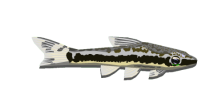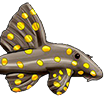A recent Facebook post by somebody quoting PlanetCatfish on the etymology of brought to my attention the etymology listed on the CLOG page:
Moreover, checking , I see virtually the same on PlanetCatfish:PlanetCatfish wrote:Etymology: Greek, mastax, -agos = bite + Greek, glanis = a fish that can eat the bait without touching the hook; a cat fish.
Myoglanis: Greek, myos = muscle, and also, mouse + Greek, glanis = a fish that can eat the bait without touching the hook; a cat fish.
However, looking up the original description HERE of the genus (as ), I see this:
And while the root derivations for do match the original Eigenmann description of the genus (HERE, and see pic below, taken from original publication), the embellishment about eating bait without touching the hook is again absent.Etymology. —From the Greek mastix (mastigo, in latinized form) meaning whip, in allusion to the filamentous elements of pectoral and dorsal fins; and glanis, the name of the Greek catfish of Aristotle, a common denomination for fishes of the order Siluriformes. The last two letters of the word mastigo were suppressed for the sake of euphony. Gender masculine.
I get that "glanis" is a reference to catfish, but where is the "eat bait without touching the hook" coming from? Is there an alternate source for the generic etymology to yield the "eat bait without touching the hook" interpretation? Or am I reading it wrong? - Is the understood ancient Greek definition of a "cat fish" equal to "a fish that can eat the bait without touching the hook?"
Cheers, Eric










